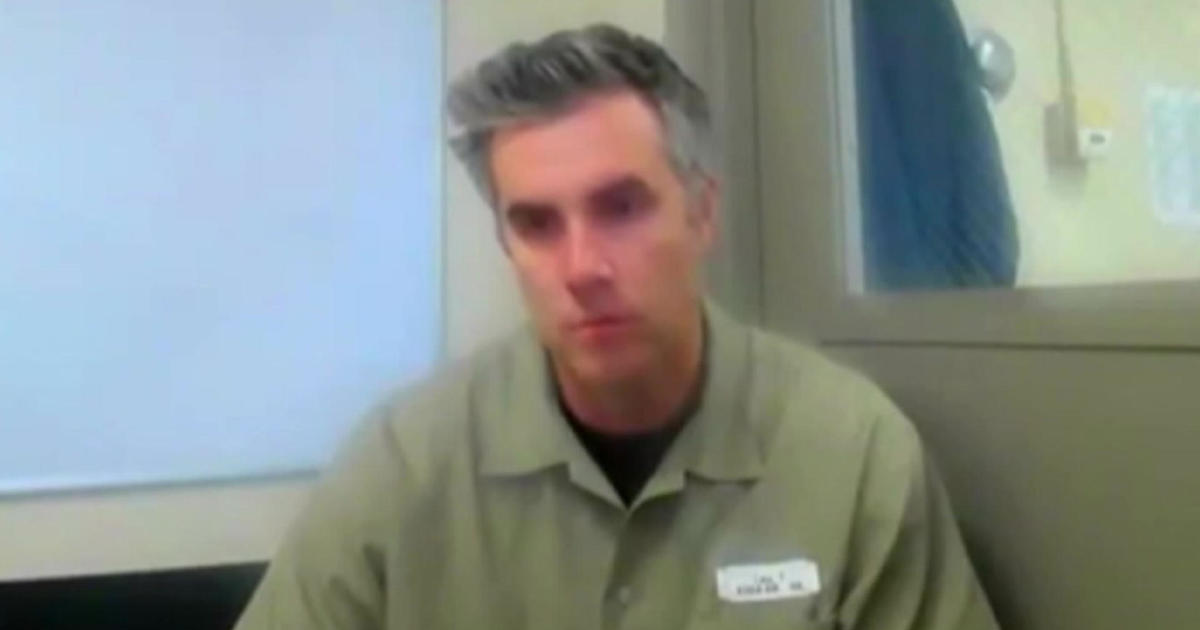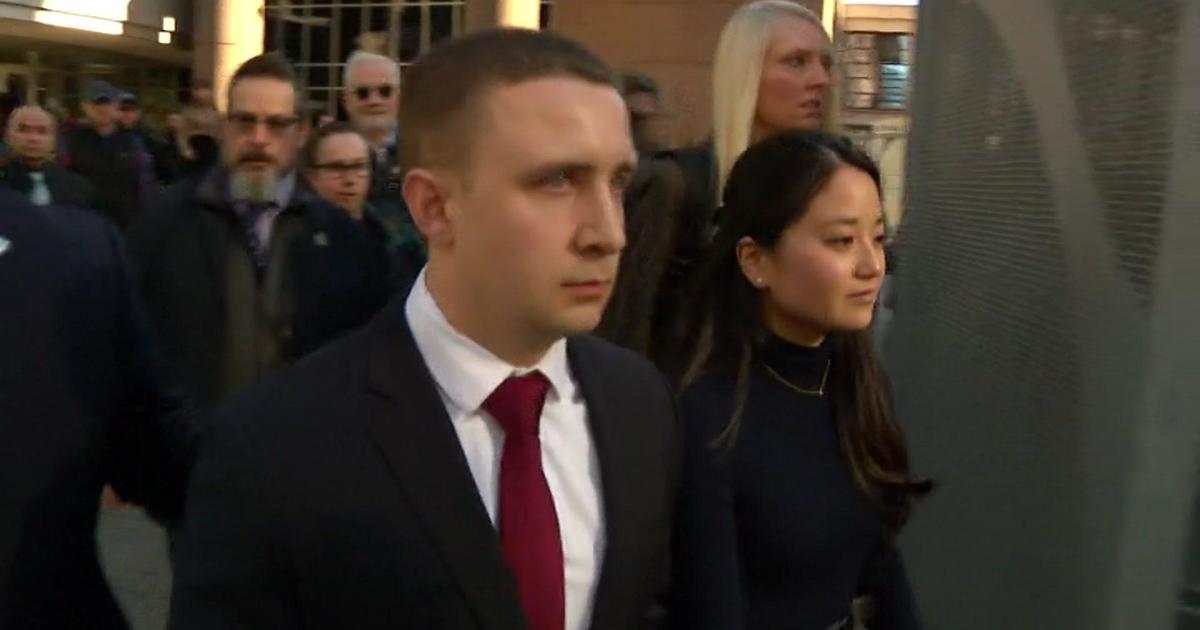Derek Chauvin Trial, April 6 Live Updates: LAPD Sgt. Stiger, Use Of Force Expert, Says Chauvin's Force Was 'Excessive'
UPDATE (3:10 p.m.): As the state's expert witness, Sgt. Jody Stiger has reviewed all body cam footage, other videos including cell phone videos, reports, manuals from MPD, and training materials in his review of the May 25 incident.
Stiger said George Floyd was actively resisting arrest at first, but wasn't after he was put in the prone position. He said that the ex-officers at that time "should have slowed down and stopped their force as well."
Stiger says, in his opinion, that Chauvin's actions on May 25 were "excessive."
Court breaks for the day, with Stiger returning Wednesday.
UPDATE (2:40 p.m.): Los Angeles Police Sgt. Jody Stiger is testifying in the Derek Chauvin trial as a law enforcement expert.
Stiger has been with the LAPD since 1993, and has worked with homicide and gang units. He has extensive experience with use of force reviews, and has done about 2,500 use of force reviews over his career.
UPDATE (2:30 p.m.): Defense attorney Eric Nelson asks Officer Nicole Mackenzie if CPR could be stopped due to outside factors making the situation not safe.
"That would be reasonable," she said.
Mackenzie talks about fentanyl and its dangers, and says she has seen use of it increase.
Defense asks Mackenzie about excited delirium, which she calls a medical condition. She says usually illicit drugs are a contributing factor in the condition.
In defense cross examination, Mackenzie says rendering aid to a person can be distracting/difficult if there are environmental concerns. "If you don't feel safe... it's very difficult to focus."
Says getting out of the situation is sometimes best.
Mackenzie is excused for the day, but the defense will be calling her back for its case later, likely next week. That means the prosecution may rest its case by the end of the week, or early next week.
UPDATE (2 p.m.): State asks Officer Nicole Mackenzie about CPR training. She runs them through the course. She says part of the training is, if the subject doesn't have a pulse, that CPR should begin immediately.
She also adds that just because someone can talk, they aren't necessarily breathing adequately. Defense begins their cross examination.
UPDATE (1:30 p.m.): Derek Chauvin trial testimony continues with Minneapolis Police Officer Nicole Mackenzie taking the stand.
She has been an officer for six years, all with Minneapolis police, and trains in medical support, including CPR. Prosecution is asking her about CPR training.
UPDATE (12:29 p.m.): Eric Nelson, the attorney for Derek Chauvin, cross examined Lt. Johnny Mercil, a use of force trainer with the Minneapolis Police Department. When Mercil viewed still images from body-worn camera footage of George Floyd's arrest, he told the court that Chauvin did not appear to be using a neck restraint against Floyd.
Instead, Mercil said that the footage showed Chauvin using a "prone hold an officer may apply with his knee." Mercil noted that in at least one of the images, Chauvin's knee appeared to be placed between Floyd's shoulder blades, with his shin along Floyd's neck. The defense showed a similar hold position to the court from a Minneapolis Police Department training slide.
Mercil, an expert witness called by the state, testified that there are certain circumstances where it's appropriate for officers to hold someone until the scene is safe. He said that the use of body weight can be used to pin someone down as a de-escalation technique. However, he said it'd be questionable to hold someone until paramedics arrived if they needed medical help.
When asked if he had trained officers that if a person can talk while in the prone position can then they can also breathe, Mercil said: "Yes, it's been said."
In redirect, prosecutor Steve Schleicher asked Mercil if it'd be appropriate for officers to hold someone in a prone restrained position if they stopped resisting or lost their pulse. No, Mercil said.
Earlier in the morning, Mercil testified that pressure applied to someone in the prone position could risk positional asphyxia. He said that handcuffed people in the prone position should be moved to a recovery position once they are compliant.
Mercil is currently on medical leave from the Minneapolis Police Department. He is one of over 100 officers to go on leave last year following Floyd's death and the unrest in the Twin Cities.
UPDATE (10:30 a.m.): Johnny Mercil, a lieutenant with the Minneapolis Police Department, takes the stand in the trial of Derek Chauvin. He is the first use of force expert witness called by the state.
Mercil testifies that he works full time as a use of force instructor in the Minneapolis Police Department. He attended courses designed for trainers and practices Brazilian Jiu Jitsu.
According to a document presented in court, Mercil conducted defensive tactics training that Chauvin attended in 2018. The state showed several slides from that training.
Mercil testified that use of force needs to be reasonable from the time it starts and to the time it stops. He added that officers should use the lowest level of force possible to meet their objectives.
When asked about neck restraints, Mercil said that they are not supposed to be used against people who are passively resisting. When asked if Chauvin kneeling on Floyd's neck was a trained neck restraint, Mercil said no.
UPDATE (10:15 a.m.): Day seven of testimony in the Derek Chauvin trial begins with Sgt. Ker Yang of the Minneapolis Police Department. Yang, a 24-year veteran of the force, is the department's crisis intervention training coordinator.
Yang testified that while he knew Chauvin through training, he didn't know him personally. He says that Chauvin, a veteran officer, went through refresher training courses that he created.
Yang told the court about the Minneapolis Police Department's Critical Decision Making Model, on which officers are trained to follow when dealing with people in crisis.
"What you see in the middle circle are voice, neutrality, respect and trust," said Yang, referring to a slide of the model presented in court. "Those are the pillars of procedural justice."
Eric Nelson, Chauvin's attorney, cross examined Yang about the model in circumstances where there are bystanders. Yang confirmed that under the model, there are situations were citizens could pose a threat or risk.
UPDATE (9 a.m.): Adrienne Cousins, the public defender for Morries Hall, who was allegedly in a vehicle with George Floyd before his arrest on May 25, says that her client will invoke the 5th Amendment in the case so as not to incriminate himself. She said that Hall risks being charged with third-degree murder in Floyd's death.
In a motions hearing Monday morning, Judge Peter Cahill agreed that most questions the defense had for Hall would incriminate him. However, the judge said that he believes that there's a "narrow topic that might be permissible" for Hall to testify on without incriminating himself. That would be how Hall would describe Floyd in the car before the arrest.
Cahill asked Eric Nelson, the attorney for Derek Chauvin, to submit questions to be reviewed by Hall and his lawyer. A decision on whether or not Hall will testify is expected in the coming days.
Last week, Courteney Ross, who was Floyd's girlfriend, testified that Hall sold Floyd and her drugs as recently as a week before his death.
MINNEAPOLIS (WCCO) -- A day after Minneapolis Police Chief Medaria Arradondo took the stand in the Derek Chauvin trial, more Minneapolis police officers are expected to testify on Tuesday. So far, the jury has heard a number of high-ranking officers condemn Chauvin's decision to kneel on George Floyd's neck, calling the restraint against policy and "totally unnecessary."
Court is set to resume at 8:30 a.m. with a motions hearing concerning the possible testimony of Morries Hall, who has invoked the 5th Amendment so as to not incriminate himself. According to the testimony of Courteney Ross, the girlfriend of George Floyd, Hall was in a vehicle with Floyd when officers arrested him on May 25 at 38th and Chicago. Ross told the court that Hall sold drugs to her and Floyd, as recently as a week before Floyd's death.
Defense attorney Joe Tamburino, who is not affiliated with the case, said that the Minnesota Attorney General's Office could grant Hall immunity in the case, thereby forcing him to testify. If granted immunity, Hall could testify as soon as Tuesday.
RELATED: Watch WCCO-TV's Gavel-To-Gavel Coverage Of The Derek Chauvin Trial
Following the hearing, testimony is slated to resume around 9:15 a.m. More Minneapolis police officers are expected to take the stand. WCCO-TV is streaming gavel-to-gavel coverage of the trial on CBSN Minnesota. Jason DeRusha is anchoring the coverage, and Tamburino is offering expert analysis.
In hours of testimony on Monday, Arradondo, the chief of Minneapolis police, told the court that when Chauvin knelt on Floyd's neck for nearly 10 minutes it was against department policy. "Once Mr. Floyd had stopped resisting, and certainly once he was in distress and trying to verbalize that, that should have stopped," he said. He added that he also believes Chauvin violated the department's policy on rendering medical aid.
Cross examination by Eric Nelson, Chauvin's attorney, focused on the difference between the department's best practices and the situational nature of police work. The defense is trying to convince the jury that Floyd died due to underlying health conditions and a drug overdose, not Chauvin's knee on his neck.
RELATED: Mpls. Police Chief Arradondo Says Derek Chauvin's Actions Violated Dept. Policies
Arradondo, the city's first Black chief, fired Chauvin and three other officers involved in Floyd's death the day after the fatal encounter. Chauvin is facing charges of second-degree murder, third-degree murder and manslaughter. The other three former officers -- Tou Thao, Thomas Lane, and J. Alexander Kueng -- are charged with aiding and abetting Chauvin. They are scheduled to stand trial in August.
Also on Monday, the jury heard testimony from Katie Blackwell, the Minneapolis Police Department's 5th Precinct inspector and former training commander. She said that she's known Chauvin for almost 20 years and confirmed that Chauvin had training on defensive tactics several times.
When prosecutors displayed an image of Chauvin kneeling on Floyd's neck and asked if that is a technique on which the Minneapolis Police Department trains officers, Blackwell said: "It is not. I don't know what kind of improvised position that is, so that's not what we train."



